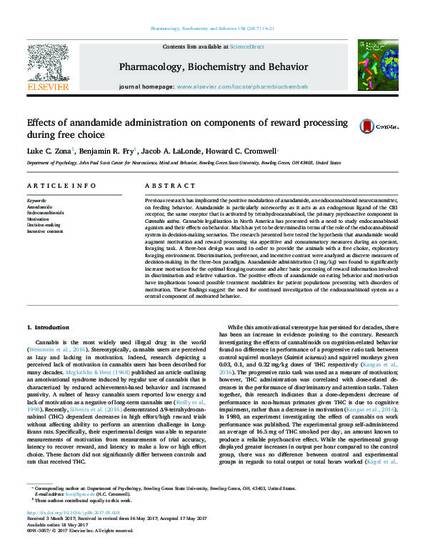
Article
Effects of anandamide administration on components of reward processing
Pharmacology, Biochemistry and Behavior
(2017)
Abstract
Previous research has implicated the positive modulation of anandamide, an endocannabinoid neurotransmitter,on feeding behavior. Anandamide is particularly noteworthy as it acts as an endogenous ligand of the CB1receptor, the same receptor that is activated by tetrahydrocannabinol, the primary psychoactive component in Cannabis sativa. Cannabis legalization in North America has presented with a need to study endocannabinoid agonists and their effects on behavior. Much has yet to be determined in terms of the role of the endocannabinoid system in decision-making scenarios. The research presented here tested the hypothesis that anandamide wouldaugment motivation and reward processing via appetitive and consummatory measures during an operant,foraging task. A three-box design was used in order to provide the animals with a free choice, exploratory foraging environment. Discrimination, preference, and incentive contrast were analyzed as discrete measures of decision-making in the three-box paradigm. Anandamide administration (1 mg/kg) was found to significantly
increase motivation for the optimal foraging outcome and alter basic processing of reward information involved in discrimination and relative valuation. The positive effects of anandamide on eating behavior and motivation have implications toward possible treatment modalities for patient populations presenting with disorders of motivation. These findings suggest the need for continued investigation of the endocannabinoid system as a
central component of motivated behavior.
Disciplines
- Life Sciences,
- Neuroscience and Neurobiology,
- Behavioral Neurobiology,
- Cognitive Neuroscience,
- Pharmacology, Toxicology and Environmental Health,
- Pharmacology,
- Alternative and Complementary Medicine,
- Pharmacy and Pharmaceutical Sciences,
- Medicinal and Pharmaceutical Chemistry and
- Psychiatry and Psychology
Publication Date
Summer May 16, 2017
Citation Information
Howard C Cromwell. "Effects of anandamide administration on components of reward processing" Pharmacology, Biochemistry and Behavior (2017) Available at: http://works.bepress.com/howard_casey_cromwell/22/
